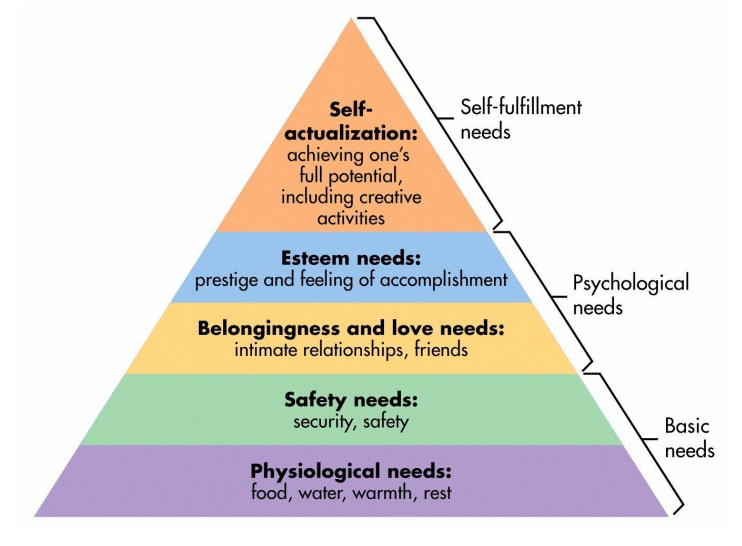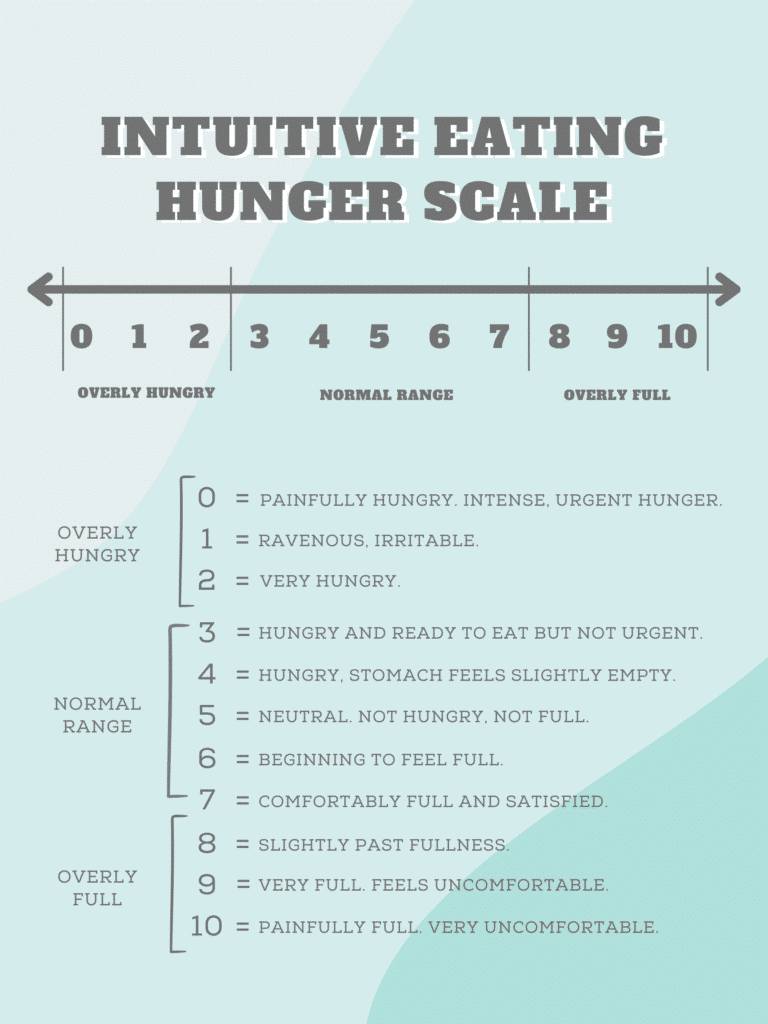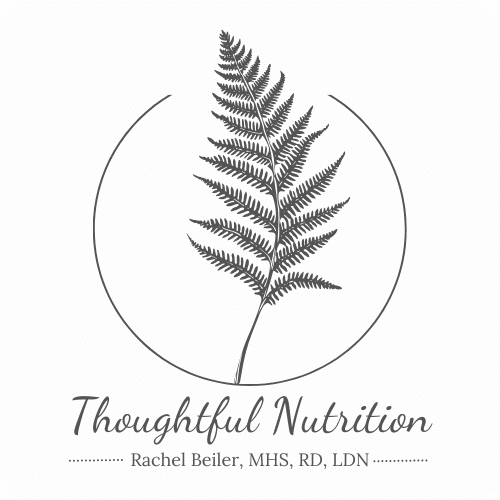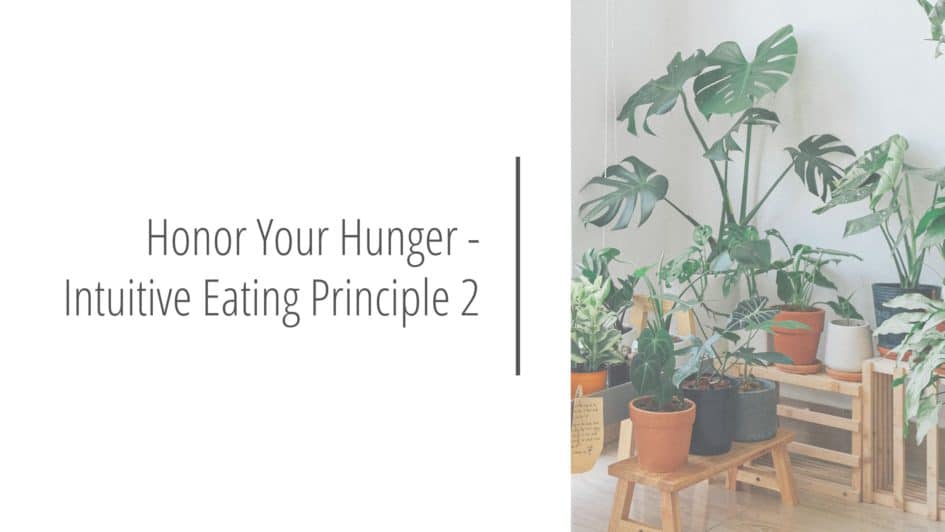Table of Contents
Honor Your Hunger
Even if you are only vaguely familiar with Intuitive Eating (IE), odds are you have heard the term honor your hunger or something similar. When someone is first introduced to IE, the two principles they are typically presented with are Honor Your Hunger and Feel Your Fullness. Due to this, Intuitive Eating is often mislabeled as a hunger-fullness diet. This grossly oversimplifies IE. Besides, IE is not a diet, it’s actually anti-diet.
Although honoring your hunger sounds straightforward, there’s more than meets the eye. To help you dive deeper into this principle, I have read and re-read the abundance of information provided in Intuitive Eating – A Revolutionary Anti-Diet Approach, 4th Edition.
In this article, my goal is to provide an easy-to-understand summary of this info. After reading, I hope you develop a knowledge of Intuitive Eating Principle 2 – Honor Your Hunger. Let’s start with understanding our primal need for food.
Minnesota Starvation Study
The body’s need for food, aka energy, is incredibly important. This need is powerful enough that if we are not getting enough food, the body compensates by using biological and psychological cues to increase energy intake.
A groundbreaking study, known as the Minnesota Starvation Study, demonstrates the body’s innate need for food. Conducted during World War II, it was initially designed to help those suffering from famine.
The study participants were healthy males that demonstrated superior mental and physical health. For the first 3 months of the study, the participants were allowed to eat their normal, daily diets. For the following 6 months, the calorie intake of the participants was cut approximately in half. This was known as the semi-starvation period.
The effects the participants experienced during the 6 months of semi-starvation were very interesting. The observed effects are often what we associate with the chronic dieting of today.
The metabolic rate of the participants dropped by 40%. The participants were borderline obsessed with food, which lead to intense food cravings. Conversations among the participants constantly revolved around food. The eating styles of the participants changed, from normal to desperately ravenous. Personalities shifted to increased irritability, anxiousness, and depression.
After 6 months of semi-starvation, the refeeding period occurred. The participants were again allowed to eat whatever quantity of food desired. It was observed that hunger was insatiable. The participants found it hard to stop eating. Binges of 8,000 to 10,000 calories would occur. Some participants developed an irrational fear of food not being available for consumption. On average, it took the participants 5 months to get back to their normal eating patterns. Several participants never fully recovered from the experiment.
The men that participated in this study experienced the primal need for food, for energy.
A Biological Drive
If you are familiar with Maslow’s Hierarchy of Needs, then you know that food is a basic, fundamental need. Within this hierarchy, food falls under physiological needs, alongside water and other basic things. Without the base of food, we can’t even think about meeting psychological or self-fulfillment needs.

When it doesn’t get enough energy from food, the body triggers powerful mechanisms. These mechanisms trigger hunger and the desire for food. People often think responding to hunger is a lack of willpower but it is actually a biological drive. The body needs energy and it will create a way to get what it needs.
The body doesn’t know the difference between a diet and starvation. It can’t differentiate between voluntarily restricting food and not having access to enough food. It doesn’t know the difference between purposeful calorie restriction and food insecurity. The body will react to planned restriction the same way it reacts to unplanned restriction.
When the body’s hunger cues are ignored, aka dieting, the biological drive for food kicks in. This often leads to overeating and even binging. If ignored for too long, hunger cues can slowly diminish. This leads to hunger only being recognized when the body is in a ravenous, desperate state.
Hunger Triggers
Bear with me as I go on a mini science tangent🤓
If you aren’t a science-y person, the main takeaway here is that our bodies need energy. Food = energy. Thus, our bodies need food.
Neuropeptide Y (NPY)
Neuropeptide Y (NPY) is a chemical produced in the brain that triggers the body to eat carbohydrates*, which are the body’s primary and preferred source of energy.
NPY is triggered by undereating. Food deprivation directly causes the body to crave carbohydrates. The more someone denies hunger, the more NPY is produced. This leads to intense cravings and food obsession.
*Carbohydrates are an essential nutrient. The body's cells function best when receiving the proper amount of carbohydrates. If carbohydrate intake is restricted, even by a small amount, it can cause problems. The brain, nervous system, and red blood cells run only on glucose, which is a form of carbohydrate. Low-carb diets can lead to kidney stones, osteoporosis, hyperlipidemia, and more.
Powerhouse Cell Theory
According to cellular researchers, hunger signals are due to the energy need of the body’s cells. When the power of the body’s cells is low, it triggers a signal that produces hunger. These researchers propose that all nutrients that provide energy will eventually get converted into a compound called ATP. ATP is the molecular compound that provides the body’s cells with energy, thus fueling the body. In the end, the body’s hunger signal is triggered by the cells’ overall need for ATP.
When Hunger Goes Silent
Not everyone has proper hunger cues. Here are a couple of reasons why that might be the case.
- Numbing: Numbing occurs when hunger is ignored by consuming something other than food. This is most commonly achieved with calorie-free beverages such as diet soda, coffee, and tea. These are used to fill the stomach up with liquid in an attempt to trick the stomach into thinking it’s full.
- Dieting: People who often or constantly diet become used to denying their hunger to the point that it can no longer be felt.
- Stress: Hunger is easily suppressed or ignored when a constant state of stress is present.
- Trauma: A history of trauma may take away the feeling of safety that is required to feel hungry.
- Basic needs aren’t met: If someone is unable to have their basic needs met, like enough sleep, it can make hunger cues difficult to sense.
Reclaim Normal Eating
In order to reclaim normal eating, which is free of dieting, you need to honor your biological hunger. The body needs to know it will have consistent access to food. It needs to be biologically reconditioned to not expect food deprivation.
How to Honor Your Hunger
Learning how to honor your hunger does not happen overnight but there are tools to help you succeed.
Identifying Hunger
Common signs of hunger, ranging from mild hunger to ravenous hunger include feeling mild stomach gurgles, hearing growl-like noises from the abdominal area, feeling lightheaded or faint, experiencing difficulty concentrating, feeling uncomfortable stomach pains, mood shifting to something such as irritability, and even experiencing a headache.
As previously stated, not everyone can physically feel hunger. This could be due to dieting, trauma history, numbing, or stress amongst many other things. If gauging hunger is difficult for you, a generally good rule of thumb is to go no longer than 5 daytime hours without eating. This timing is based on the carbohydrate storage that’s available in the liver, which needs to be replenished every 3-6 hours, as it runs out of resources. However, some people find it more helpful to eat every 3-4 hours. It all depends on what works best for you.
Be patient with yourself. In time you will learn how to identify and honor your hunger.
Types of Hunger
Another important factor to consider is the different types of hunger.
- Physical hunger: the type of hunger we have been discussing; aka biological hunger
- Taste hunger: wanting to eat simply because something sounds good
- Practical hunger: also known as planning ahead hunger; this is where you might eat before you physically feel hungry because you know you won’t have the opportunity to eat when you actually become hungry: an example would be eating an early lunch because you have a work meeting over your typical lunch period
- Emotional hunger: hunger used to satisfy uncomfortable feelings such as loneliness, guilt, despair, boredom, anger, etc.
All forms of hunger should be honored, not just physical hunger. Recognizing the different forms of hunger allows us to avoid setting rigid rules around eating only when we are physically hungry. Doing this helps keep us from slipping back into the diet mentality of restriction. It will take time to find this balance!
The Intuitive Eating Hunger Scale
To read an in-depth explanation of the Intuitive Eating Hunger Scale, check out this article.
The Intuitive Eating hunger scale is a tool that can be used when practicing Intuitive Eating (IE). It is used to assess your level of hunger versus your level of fullness.
The scale ranges from 0-10 with 0-2 being overly hungry, 3-7 being the normal range of hunger, satisfaction, & fullness, and 8-10 being overly full.
This can be used as a guide when first starting your Intuitive Eating journey or even as a nice reminder when you are a seasoned intuitive eater.

Quick Summary – Honor Your Hunger
To summarize, hunger is a primal need. We cannot expect to succeed in important areas of life, such as relationships or personal goals, if this basic need is not properly met.
The body does not know the difference between dieting and starvation. It doesn’t know the difference between purposeful restriction and unplanned deprivation. If we restrict calorie intake or go through a period of food deprivation, the body will react and trigger hunger in a variety of ways. This reaction can lead to intense cravings and ravenousness, especially for carbohydrates since they are the body’s preferred and primary source of energy.
Honoring hunger (including all forms of hunger) is not a skill that develops overnight. It takes time and patience. A great way to learn this skill is to utilize the Intuitive Eating Hunger Scale. The scale can help hone the feeling of hunger which in turn will help in honoring that feeling.
Slowly but surely, if you put in the effort, you will learn how to practice Intuitive Eating Principle #2, Honor Your Hunger.
Dig Deeper
If you would like to dig deeper into Intuitive Eating, I recommend grabbing a copy of Intuitive Eating – A Revolutionary Anti-Diet Approach, 4th Edition by Evelyn Tribole and Elyse Resch. It can be found where books are sold, including Amazon. The official Intuitive Eating Website is also a great resource.
For additional reading, check out the Intuitive Eating section on my website. Whether you’re a newbie intuitive eater or a seasoned one, take a look at my anti-diet themed store for fun Intuitive Eating products!
Thanks for reading!
Rachel Beiler, MHS, RD, LDN
References
Intuitive Eating: A Revolutionary Anti-Diet Approach, 4th Edition by Evelyn Tribole & Elyse Resch


1 Pingback